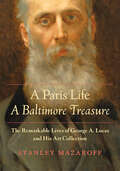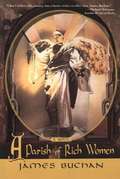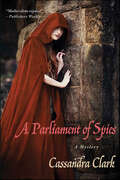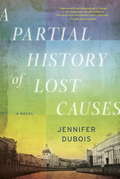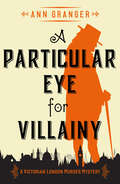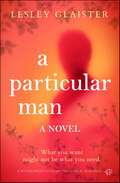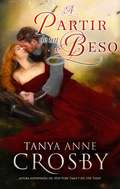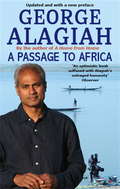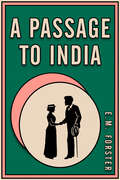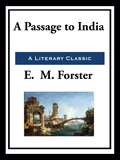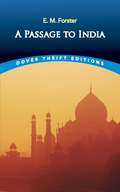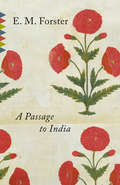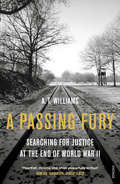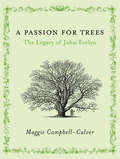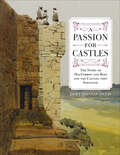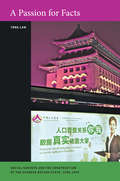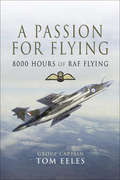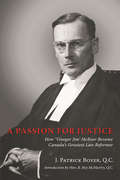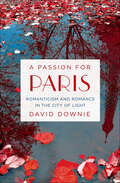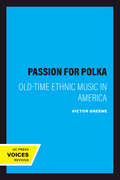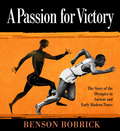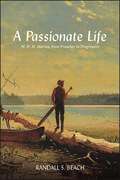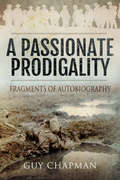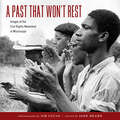- Table View
- List View
A Paris Life, A Baltimore Treasure: The Remarkable Lives of George A. Lucas and His Art Collection
by Stanley Mazaroff“[An] elegantly written account of all facets of the life and career of George A. Lucas . . . of Belle Époque Paris and Gilded Age America.” —Inge Reist, Director Emeritus of The Frick Collection’s Center for the History of CollectingIn 1857, young Baltimorean George A. Lucas arrived in Paris, where he established an extensive personal network of celebrated artists and art dealers, becoming the quintessential French connection for American collectors. The most remarkable thing about Lucas was not the art that he acquired for his clients but the massive collection of 18,000 paintings, drawings, sculptures, and etchings, as well as 1,500 books, journals, and other sources about French artists, that he acquired for himself. Paintings by Cabanel, Corot, and Daubigny, prints by Whistler, Manet, and Cassatt, and portfolios of information about hundreds of French artists filled his apartment and spilled into the adjacent flat of his mistress.Based primarily on Lucas’s notes and diaries, as well as thousands of other archival documents, A Paris Life, A Baltimore Treasure is a richly illustrated portrayal of Lucas’s fascinating life as an agent, connoisseur, and collector of French mid-nineteenth-century art. And, as revealed in the book, following Lucas’s death, his enormous collection continued to have a vibrant life of its own, when—in 1990—Baltimore’s Maryland Institute proposed to auction or otherwise sell the collection. It rose from obscurity, reached new glory as an irreplaceable cultural treasure, and became the subject of an epic battle fought in and out of court that captivated public attention and enflamed the passions of art lovers and museum officials across the nation.“Mazaroff has thoughtfully recreated the legacy of one of America’s best documented late-nineteenth-century French art collections.” —Doreen Bolger, Director Emeritus, The Baltimore Museum of Art
A Parish Of Rich Women
by James BuchanTells of two societies at the point of collapse: an England clinging desperately to the wreckage of its history & Beirut under bombardment.
A Parliament of Spies: A Mystery (Abbess Hildegard of Meaux)
by Cassandra ClarkAll the danger and intrigue of 14th-century England spring to life in this "compelling" (Publishers Weekly) series about the brave, incorruptible Abbess of Meaux.Abbess Hildegard may consider herself "just a nun with no useful skills or connections," yet her loyalty and intelligence have brought her to the attention of King Richard II himself—not the safest place to be, when the king has enemies on all sides. As Hildegard wrestles with her role as a spy in the parliament that is hastily gathering at Westminster, Cassandra Clark's A Parliament of Spies shows us the human side of history, giving readers new reason to follow Publishers Weekly's rallying cry: "Medievalists rejoice!"
A Partial History of Lost Causes
by Jennifer Dubois"[An] astonishingly beautiful and brainy debut . . . [a] stunning novel."--O: The Oprah Magazine"In Jennifer duBois' gorgeous novel, A Partial History of Lost Causes, the personal, theoretical, and political are braided together into a seamless whole. . . . Moving yet startlingly funny--full of bravado, insight, and clarity. A Partial History of Lost Causes is a thrilling debut by a young writer who evidently shares the uncanny brilliance of her protagonists."--ElleIn Jennifer duBois's mesmerizing and exquisitely rendered debut novel, a long-lost letter links two disparate characters, each searching for meaning against seemingly insurmountable odds. In St. Petersburg, Russia, world chess champion Aleksandr Bezetov begins a quixotic quest. With his renowned Cold War-era tournaments behind him, Aleksandr has turned to politics, launching a dissident presidential campaign against Vladimir Putin. He knows he will not win--and that he is risking his life in the process--but a deeper conviction propels him forward. And in the same way that he cannot abandon his aims, he cannot erase the memory of a mysterious woman he loved in his youth.In Cambridge, Massachusetts, thirty-year-old English lecturer Irina Ellison is on an improbable quest of her own. Certain she has inherited Huntington's disease--the same cruel illness that ended her father's life--she struggles with a sense of purpose. When Irina finds an old, photocopied letter her father had written to the young Aleksandr Bezetov, she makes a fateful decision. Her father had asked the Soviet chess prodigy a profound question--How does one proceed against a lost cause?--but never received an adequate reply. Leaving everything behind, Irina travels to Russia to find Bezetov and get an answer for her father, and for herself.Spanning two continents and the dramatic sweep of history, A Partial History of Lost Causes reveals the stubbornness and splendor of the human will even in the most trying times. With uncommon perception and wit, Jennifer duBois explores the power of memory, the depths of human courage, and the endurance of love.From the Hardcover edition.
A Particular Eye for Villainy (The Inspector Ben Ross Mysteries)
by Ann GrangerFrom &“an accomplished veteran&” of crime fiction, a Victorian murder mystery featuring a female sleuth and her detective husband (Kirkus Reviews). When Mr. Thomas Tapley is found bludgeoned to death in his sitting room, his neighbor, Inspector Benjamin Ross of Scotland Yard, is immediately summoned. Little is known about the elusive gentleman until Mr. Jonathan Tapley, QC, hears of the news, and the truth about his cousin's tragic past slowly begins to emerge. Meanwhile, Ben&’s wife, Lizzie, is convinced she saw someone following Thomas Tapley on the day he died, and she discovers that he received a mysterious visitor a few days before his death. As the list of suspects begins to mount, Ben and Lizzie must unearth who would benefit most from Tapley's unfortunate demise.
A Particular Man
by Lesley GlaisterLove never dies in this novel by &“a writer of addictive emotional thrillers&” (The Independent). Told from three perspectives A Particular Man is about love, truth and the unpredictable consequences of loss. When Edgar dies in a Far East prisoner of war camp it breaks the heart of fellow prisoner Starling. In Edgar&’s final moments, Starling makes him a promise. When, after the war, he visits Edgar&’s family to fulfill this promise, Edgar's mother Clementine mistakes him for another man. Her mistake allows him access to Edgar&’s home and to those who loved him, stirring powerful and disorientating emotions, and embroiling him in a web of deceit. The loss has driven his sister Aida to seek solace in the arms of a series of men—but the meeting with Starling sparks a complex connection, fueled by their mutual longing for Edgar. Meanwhile Clementine, also grieving for Edgar, has secrets of her own… &“One of Britain&’s finest novelists.&” —The Sunday Telegraph &“[Glaister] commands respect for writing novels which are not just dark and mysterious but also emotionally satisfying.&” —The Times Literary Supplement &“An expert plotter.&” —The Scotsman
A Partir de un Beso
by Tanya Anne Crosby Silvana BorghiElla llegó para casarse con uno de los hermanos d'Lucy y le robó el corazón al Dragón... el otro hermano... Para finalizar una disputa, Dominique Beauchamp estaba resignada a casarse con el fin de sanar las heridas entre sus tierras. Ofrecida en matrimonio por su hermano al señor de Drakewich, ella vino a tomar el nombre de d'Lucy ... pero nunca contó con que perdería el corazón por el hermano de su prometido, el Dragón Negro. Blaec d'Lucy desconfiaba de ella desde el principio, creía que era parte de infinitas traiciones de su hermano, pero era incapaz de resistirse a esa mujer de cabello como de fuego, que cabalgó con tanto orgullo en medio de ellos. Su amor se selló ... a partir de un beso.
A Passage To Africa
by George AlagiahAs a five-year-old, George Alagiah emigrated with his family to Ghana - the first African country to attain independence from the British Empire. A PASSAGE TO AFRICA is Alagiah's shattering catalogue of atrocities crafted into a portrait of Africa that is infused with hope, insight and outrage. In vivid and evocative prose and with a fine eye for detail Alagiah's viewpoint is spiked with the freshness of the young George on his arrival in Ghana, the wonder with which he recounts his first impressions of Africa and the affection with which he dresses his stories of his early family life. A sense of possibility lingers, even though the book is full of uncomfortable truths. It is a book neatly balanced on his integrity and sense of obligation in his role as a writer and reporter. The shock of recognition is always there, but it is the personal element that gives A PASSAGE TO AFRICA its originality. Africa becomes not only a group of nations or a vast continent, but an epic of individual pride and suffering.
A Passage To Africa
by George AlagiahAs a five-year-old, George Alagiah emigrated with his family to Ghana - the first African country to attain independence from the British Empire. A PASSAGE TO AFRICA is Alagiah's shattering catalogue of atrocities crafted into a portrait of Africa that is infused with hope, insight and outrage. In vivid and evocative prose and with a fine eye for detail Alagiah's viewpoint is spiked with the freshness of the young George on his arrival in Ghana, the wonder with which he recounts his first impressions of Africa and the affection with which he dresses his stories of his early family life. A sense of possibility lingers, even though the book is full of uncomfortable truths. It is a book neatly balanced on his integrity and sense of obligation in his role as a writer and reporter. The shock of recognition is always there, but it is the personal element that gives A PASSAGE TO AFRICA its originality. Africa becomes not only a group of nations or a vast continent, but an epic of individual pride and suffering.
A Passage to India: A Novel
by E. M. ForsterWhen Adela Quested and her elderly companion Mrs. Moore arrive in the Indian town of Chandrapore, they quickly feel trapped by its insular and prejudiced &‘Anglo-Indian&’ community. Determined to escape the parochial English enclave and explore the &‘real India,&’ they seek the guidance of the charming and mercurial Dr Aziz, a cultivated Indian Muslim. But a mysterious incident occurs while they are exploring the Marabar caves with Aziz, and the well-respected doctor soon finds himself at the centre of a scandal that rouses violent passions among both the British and their Indian subjects. A masterly portrait of a society in the grip of imperialism, A Passage to India compellingly depicts the fate of individuals caught between the great political and cultural conflicts of the modern world. Penguin Random House Canada is proud to bring you classic works of literature in e-book form, with the highest quality production values. Find more today and rediscover books you never knew you loved.
A Passage to India: Penguin Essentials (Csa Word Recording Ser. #47)
by E. M. ForsterA Passage to India' is set against the backdrop of the British Raj and the Indian independence movement in the 1920s. It was selected as one of the 100 great works of 20th century English literature by the Modern Library and won the 1924 James Tait Black Memorial Prize for fiction. Time magazine included the novel in its All Time 100 Novels list. The novel is based on Forster's experiences in India and the title is derived from Walt Whitman's 1870 poem "Passage to India" in Leaves of Grass. 'A Passage to India' explores the common racial tensions and prejudices between Indians and the British who ruled India. One of the greatest novels every written.
A Passage to India: Penguin Essentials (Dover Thrift Editions #47)
by E. M. ForsterAt the dawn of the twentieth century, the peak of the British colonial era, a visiting English schoolteacher and her traveling companion express a desire to see a more authentic side of India. One of their new friends, a young Muslim doctor, arranges a trip to a natural wonder, the Marabar Caves—a disastrous excursion that concludes with the schoolteacher accusing the doctor of attempting to rape her. His arrest and trial divide an already troubled Indian community, bringing its racial and sexual tensions to a boil. Widely regarded as one of the greatest novels of the twentieth century, A Passage to India reflects the country's rising nationalism. E. M. Forster's 1924 tale offers a stirring condemnation of the abuses of British colonialism. Written at the height of Forster's career, the book recaptures a heated political atmosphere and offers a foreigner's view of India as a place of mystery and exotic beauty, inhabited by a people unknowable to outsiders.
A Passage to India: Penguin Essentials (Vintage Classics #47)
by E. M. ForsterBritain&’s three-hundred-year relationship with the Indian subcontinent produced much fiction of interest but only one indisputable masterpiece: E. M. Forster&’s A Passage to India, published in 1924, at the height of the Indian independence movement. Centering on an ambiguous incident between a young Englishwoman of uncertain stability and an Indian doctor eager to know his conquerors better, Forster&’s book explores, with unexampled profundity, both the historical chasm between races and the eternal one between individuals struggling to ease their isolation and make sense of their humanity.
A Passing Fury: Searching for Justice at the End of World War II
by A. T. WilliamsA Daily Telegraph Book of the YearShortlisted for the CWA Gold Dagger for Non-Fiction 2017After the Second World War, the Nuremberg Tribunal became a symbol of justice in the face of tyranny, aggression and atrocity. But it was only a fragment of retribution as, with their Allies, the British embarked on the largest programme of war crimes investigations and trials in history.This book exposes the deeper truth of this endeavour, moving from the scripted trial of Goering, Hess and von Ribbentrop to the makeshift courtrooms where the SS officers, guards and executioners were prosecuted. It tells the story of the investigators, lawyers and perpetrators and asks the question: was justice done?
A Passion For Trees: The Legacy Of John Evelyn
by Maggie Campbell-CulverGiven the extent of his influence on 17th-century life, and his lasting impact on the British landscape it is remarkable that no book has been written before about John Evelyn. He was a longstanding friend of Samuel Pepys (who wrote of him, ' A most excellent person he is, and must be allowed a little for conceitedness; but he may well be so, being a man so much above others.'), a founder-member of the Royal Society and a prolific writer and diarist. He was an early advocate of the garden city but his most important work was Sylva: a Discourse of Forest Trees. Sylva was presented to the Royal Society to promote the planting of timber trees 'for the supply of the Navy, the employment and advantage of the poor as well as the ornamenting of the nation.' He was responsible for the first great raft of tree-planting and for a great influx of tree introductions to Britain.Maggie Campbell-Culver's book, like Sylva, has at its core a section detailing the characteristics, history and uses of 33 trees incorporating the advice Evelyn gave and demonstrating its relevance still in the 20th-century. Not only was Evelyn probably the first horticultural writer to show an appreciation of the aesthetic benefits of trees in our landscape, he is shown to be a founder-father of the modern conservation movement.
A Passion for Castles: The Story of MacGibbon and Ross and the Castles they Surveyed
by Janet Brennan-InglisIn the 1880s two Edinburgh architects began to survey, measure and sketch the castles of Scotland, travelling the length and breadth of the country on trains, bicycles and on foot. Together they produced the five magnificent volumes of The Castellated and Domestic Architecture of Scotland, an unrivalled work of research that surveys more than 700 of Scotland’s castellated buildings, ranging from great medieval fortresses to small lairds’ houses with pepper-pot turrets, and is illustrated with thousands of sketches and plans. The first part of A Passion for Castles tells the life stories of David MacGibbon and Thomas Ross and their work as Edinburgh architects before they embarked on their magisterial survey, revealing interesting and previously unknown details about the two men. The second part of the book sets their enormously ambitious castles project in its historical context, and describes how MacGibbon and Ross managed to achieve their pioneering, systematic and comprehensive survey. The final part of the book provides a regional overview of the current status of all the castles surveyed by MacGibbon and Ross, followed by a thematic exploration of those that have been lost, those that have been transformed and those at risk of collapse, before posing questions about what the future holds for the castles of Scotland.
A Passion for Facts
by Tong LamIn this path-breaking book, Tong Lam examines the emergence of the "culture of fact" in modern China, showing how elites and intellectuals sought to transform the dynastic empire into a nation-state, thereby ensuring its survival. Lam argues that an epistemological break away from traditional modes of understanding the observable world began around the turn of the twentieth century. Tracing the Neo-Confucian school of evidentiary research and the modern departure from it, Lam shows how, through the rise of the social survey, "the fact" became a basic conceptual medium and source of truth. In focusing on China's social survey movement, A Passion for Facts analyzes how information generated by a range of research practices--census, sociological investigation, and ethnography--was mobilized by competing political factions to imagine, manage, and remake the nation.
A Passion for Flying: 8,000 hours of RAF Flying
by Tom EelesThe story of Group Captain Tom Eeles who served in the RAF for 44 years and totaled over 8000 hours of flying in twenty-eight different aircraft types. Tom entered RAF College Cranwell in 1961, he gained his RAF wings in 1963.
A Passion for Justice: How 'Vinegar Jim' McRuer Became Canada's Greatest Law Reformer
by J. Patrick BoyerThis richly detailed biography illustrates how a determined Canadian seeking justice created an enduring legacy. Through vigorous battles, Jim McRuer’s passion for justice was translated into laws that daily touch and protect the lives of millions today. James Chalmers McRuer was not easy to get along with or even much liked by many lawyers who dubbed him ’Vinegar Jim.’ Yet countless others saw him as heroic, inspirational, a man above and apart from his times. His resolute focus on justice changed the lives of married women with no property rights, children without legal protection, aboriginals caught in the whipsaw of traditional hunting practices and imposed game laws, and prisoners locked away and forgotten. Environmental degradation and those causing it, murderers, stock fraud artists and Cold War spies all came within the ambit of J. C. McRuer’s sharp legal mind and passion for justice. Upon turning 75, McRuer embarked on his most important work of all, becoming Canada’s greatest law reformer and remaining active into his 90s.
A Passion for Paris: Romanticism and Romance in the City of Light
by David Downie"A top-notch walking tour of Paris. . . . The author's encyclopedic knowledge of the city and its artists grants him a mystical gift of access: doors left ajar and carriage gates left open foster his search for the city's magical story. Anyone who loves Paris will adore this joyful book. Readers visiting the city are advised to take it with them to discover countless new experiences." —Kirkus Reviews (starred)A unique combination of memoir, history, and travelogue, this is author David Downie's irreverent quest to uncover why Paris is the world's most romantic city—and has been for over 150 years.Abounding in secluded, atmospheric parks, artists' studios, cafes, restaurants and streets little changed since the 1800s, Paris exudes romance. The art and architecture, the cityscape, riverbanks, and the unparalleled quality of daily life are part of the equation.But the city's allure derives equally from hidden sources: querulous inhabitants, a bizarre culture of heroic negativity, and a rich historical past supplying enigmas, pleasures and challenges. Rarely do visitors suspect the glamor and chic and the carefree atmosphere of the City of Light grew from and still feed off the dark fountainheads of riot, rebellion, mayhem and melancholy—and the subversive literature, art and music of the Romantic Age.Weaving together his own with the lives and loves of Victor Hugo, Georges Sand, Charles Baudelaire, Balzac, Nadar and other great Romantics Downie delights in the city's secular romantic pilgrimage sites asking , Why Paris, not Venice or Rome—the tap root of "romance"—or Berlin, Vienna and London—where the earliest Romantics built castles-in-the-air and sang odes to nightingales? Read A Passion for Paris: Romanticism and Romance in the City of Light and find out.
A Passion for Polka: Old-Time Ethnic Music in America
by Victor GreeneNot so long ago, songs by the Andrews Sisters and Lawrence Welk blasted from phonographs, lilted over the radio, and dazzled television viewers across the country. Lending star quality to the ethnic music of Poles, Italians, Slovaks, Jews, and Scandinavians, luminaries like Frankie Yankovic, the Polka King, and "Whoopee John" Wilfart became household names to millions of Americans. In this vivid and engaging book, Victor Greene uncovers a wonderful corner of American social history as he traces the popularization of old-time ethnic music from the turn of the century to the 1960s. Drawing on newspaper clippings, private collections, ethnic societies, photographs, recordings, and interviews with musicians and promoters, Greene chronicles the emergence of a new mass culture that drew heavily on the vivid color, music, and dance of ethnic communities.In this story of American ethnic music, with its countless entertainers performing never-forgotten tunes in hundreds of small cities around the country, Greene revises our notion of how many Americans experienced cultural life. In the polka belt, extending from Connecticut to Nebraska and from Texas up to Minnesota and the Dakotas, not only were polkas, laendlers, schottisches, and waltzes a musical passion, but they shone a scintillating new light on the American cultural landscape. Greene follows the fortunes of groups like the Gold Chain Bohemians, illuminating the development of an important segment of American popular music that fed the craze for international dance music. And even though old-time music declined in the 1960s, overtaken by rock and roll, a new Grammy for the polka was initiated in 1986. In its ebullience and vitality, the genre endures.
A Passion for Victory
by Benson BobrickFrom the barefoot races of 8th century BC to the underwater obstacle courses in the early 20th century to the high-tension Berlin Games preceding World War II, the Olympics have always been exciting dramas of athletic prowess and human interest. In A Passion for Victory, award-winning author Benson Bobrick tells the details of the captivating story of the Olympic Games, starting with their inception in Ancient Greece. This wonderfully readable narrative is rich with anecdotes and profiles of athletes and weaves in important historical events to create a complete picture of each installment of the Games. This thorough account of an international fixation is gripping, poignant, and occasionally hilarious.
A Passionate Life: W. H. H. Murray, from Preacher to Progressive (Excelsior Editions)
by Randall S. BeachFinalist for the 2022 Foreword INDIES Book of the Year Award in the Biography CategoryOne hundred fifty years ago, the Adirondack Mountains were overrun. Thousands of middle-class urbanites from Boston and New York City abandoned the comfort of their homes and rushed into the unknown, northern wilderness, believing they would find great restorative and even curative powers. These would-be adventurers were informed by one man, William Henry Harrison Murray, a preacher from Boston. A Passionate Life is the first comprehensive biography of Murray, a man who has been described as the father of the American outdoor movement and the modern vacation. While he is best known for his promotion of the Adirondacks in the late nineteenth century, Murray was a complex character who was driven to promote his many passions. From the 1860s until his early twentieth-century death, Murray was a famous preacher, popular writer and lecturer, an equine enthusiast, patent owner, publisher, businessman, lumberman, temperance advocate, free lover, women's rights advocate and advocate for educational reform. In many ways, Murray's passions followed the progressive movements within nineteenth-century America and attempted to address questions still relevant to today's society.
A Passionate Prodigality: Fragments of Autobiography
by Guy ChapmanThis classic WWI memoir by a decorated infantryman and historian presents a vivid account of life in the trenches on the Western Front. During World War One, Major Guy Chapman, OBE MC, served in the Royal Fusiliers and was awarded the Military Cross for his bravery. Joining soon after war was declared, Chapman was stationed in France and fought in the Battle of Arras. When Chapman&’s memoir, A Passionate Prodigality, was first published in 1933 it was hailed as one of the finest English works to have come out of the Great War. Today it reads with a graphic immediacy, not merely in the descriptions of the shock and carnage of war, but in its evocation of the men who fought—&“certain soldiers who have now become a small quantity of Christian dust.&”
A Past That Won't Rest: Images of the Civil Rights Movement in Mississippi
by Jim LucasContributions by Howard Ball, Peter Edelman, Aram Goudsouzian, Robert E. Luckett Jr., Ellen B. Meacham, Stanley Nelson, and Charles L. OverbyA Past That Won't Rest: Images of the Civil Rights Movement in Mississippi collects never-before-published photographs taken by Jim Lucas (1944-1980), an exceptional documentary photographer. His black-and-white images, taken during 1964 through 1968, depict events from the civil rights movement including the search for the missing civil rights workers in Neshoba County, the Meredith March Against Fear, Senator Robert F. Kennedy's visit to the Mississippi Delta, and more. The photographs exemplify Lucas's technical skill and reveal the essential truth in his subjects and the circumstances surrounding them.Lucas had a gift for telling a visual story, an instinctive eye for framing his shots, and a keen human sensibility as a photojournalist. A college student in Jackson, Mississippi, in 1964, he was on his way to becoming a professional photojournalist when Freedom Summer exploded. Lucas found himself in the middle of events that would command the attention of the whole world. He cultivated his contacts and honed his craft behind the camera as a stringer for Time and Life magazines as well as the Associated Press. Lucas tragically lost his life in a car accident in 1980, but his photographs have survived and preserve a powerful visual legacy for Mississippi. Over one hundred gorgeously sharp photographs are paired with definitive essays by scholars of the events depicted, thereby adding insight and historical context to the book. Charles L. Overby, a fellow Jacksonian and young journalist at the time, provides a foreword about growing up in that tumultuous era.
